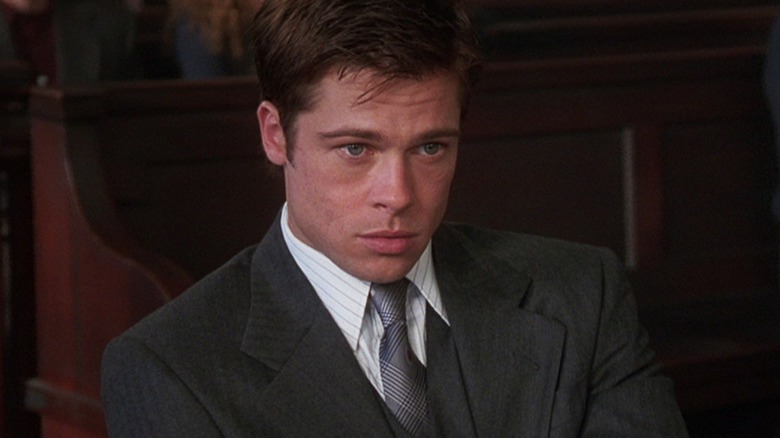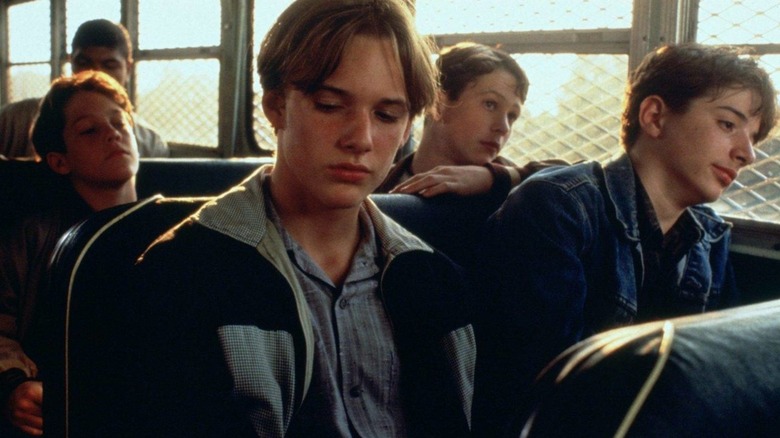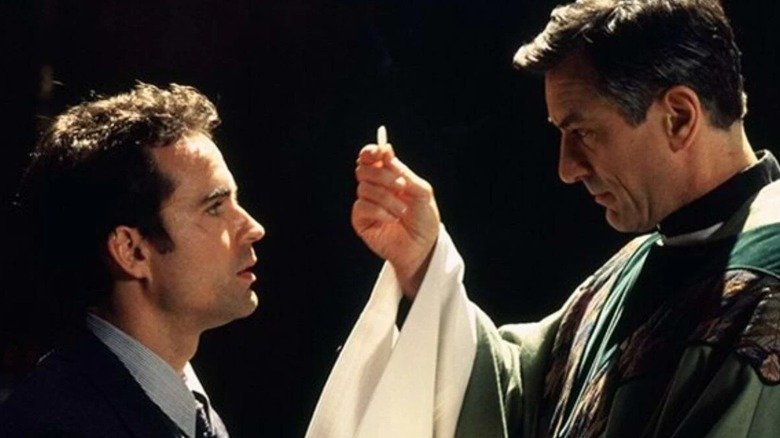This Star-Studded Brad Pitt Movie Was Based On A Controversial Memoir
"This is a true story about friendship that runs deeper than blood." These words open Barry Levinson's "Sleepers," the 1996 legal crime drama that revolves around juvenile delinquents who end up serving sentences longer than nine months. As anticipated by the film's opening lines, the story revolves around four friends who grow up in a rough neighbourhood that is overseen by two morally opposing figures — parish priest Father Bobby (Robert De Niro) and local gangster King Benny (Vittorio Gassman). While the kids often run small errands for King Benny from time to time, one unfortunate accident during the summer of 1967 completely alters the trajectory of their lives.
After stealing a hot-dog cart, the kids play around with it, and it accidentally rolls down a set of stairs and crushes a man. The four kids are sentenced to serve time at a juvenile detention center, where they're subjected to unimaginable horrors, including repeated instances of sexual abuse and torture by a sadistic guard (Kevin Bacon). Fast-forward to the near future, two of the kids (now all grown up) shoot the remorseless guard in question, while the other two use their legit positions as a journalist and assistant D.A. to help their friends outsmart the law. Just when you think this is a straightforward story about justified revenge, "Sleepers" introduces the themes of complex morality and redemption, which define the lives of thousands affected by similar social circumstances in America.
The story of Lorenzo (Jason Patric), Michael (Brad Pitt), John (Ron Eldard), and Tommy (Billy Crudup) in "Sleepers" is based on Lorenzo Carcaterra's eponymous nonfiction book that details these real-life events in startling depth. However, Carcaterra's claim that he is among the boys who experienced these harrowing events has been challenged ever since the book's publication, casting a dubious light on the veracity of the memoir. This begs the question: Is Carcaterra's "Sleepers" really a true story? Here's what we know.
Sleepers' real-life memoir has been under scrutiny for the longest time
Any memoir or personal account that is even slightly autobiographical inherently raises questions about authenticity. For starters, our recollection of memories is never perfectly aligned with objective truth (as some experiences are colored by subjective interpretation), and it is natural to want to paint oneself as slightly different than how we truly perceive ourselves (Levinson himself made four deeply personal films that are collectively dubbed as his Baltimore movies). But even when we disregard these aspects, "Sleepers" becomes controversial, as real-life institutions that were allegedly involved with the events that took place have strongly challenged Carcaterra's account.
First up is the Sacred Heart of Jesus Church and School on the West Side of Manhattan. This is the institution Carcaterra and his friends allegedly attended as children, and also the sect Father Bobby belonged to. In Carcaterra 's memoir and Levinson's adaptation, Father Bobby provides a false alibi for John and Tommy right after they're brought to trial for shooting the security guard as part of their revenge plan. The real-life Sacred Heart of Jesus Church and School vehemently refutes this claim, calling it "malicious" and defamatory (via Catholic League):
"To defame Catholic schools and priests is malicious. The entire story is a hoax: there was no crime, no one went to reform school, there was no killing, and no priest ever perjured himself."
Now, we don't know whether this official statement is truthful or not, but even the Manhattan District Attorney's office states that there are no records of a case that resembles the one in the book. Although Carcaterra didn't respond to these allegations directly, he did say that numerous details in the book were fictitious, and some were altered to protect the real individuals involved (via The New York Times):
"You have to change dates, names, places, people. The way they looked; you have to make them look a different way. If it happened here, you have to make it happen there."
Carcaterra's claims have been supported by his publishers and Levinson himself, who is convinced that these events are credible.
The credibility of Sleepers as a memoir doesn't affect the legacy of Levinson's crime drama
Reactions to the controversy surrounding "Sleepers" have been interesting, to say the least. Some believe that the entire story is a hoax, while others think that the events did happen, but not in the way that the memoir recounts them (which lines up with Carcaterra's statement about altering key details). While the truth is hard to discern at this point, the fact that Carcaterra's book is a vivid, astonishing exploration of nature vs. nurture is not up for debate.
Irrespective of whether it's fiction, non-fiction, or a hybridized account, "Sleepers" gets to the core of life-altering friendships and how the neighborhoods we grew up in end up shaping the kind of people we become. Of course, the story in "Sleepers" is hyperspecific and might not be applicable on a universal level, but it is a fascinating take on these themes that influence the microcosmic world of the book.
Although Levinson believes Carcaterra's account, he told The New York Times that his interest in adapting the book boiled down to a fascination with a central idea about choice, fate, and luck:
"What also fascinated me was the idea that one incident, in one moment, can go wrong, and forever your life will be altered. think about it in my life, and some of the things I did, and how one slightly different move could have altered everything. I hate to think about it."
This uncomfortable dilemma is the crux of Levinson's "Sleepers," as it is as much a story about rage-fueled retribution as it is about the tragic injustices that juvenile delinquents experience due to a broken system. While Levinson's star-studded drama (which is a far cry from his sole foray into a bizarre, mockumentary-style horror flick years later) is deeply flawed, it is still a gut-wrenching story that compels us to think deeper about its thematic fabric. Whether it's based on a true story or not doesn't diminish the film's impact in any way, and that is what truly matters.


